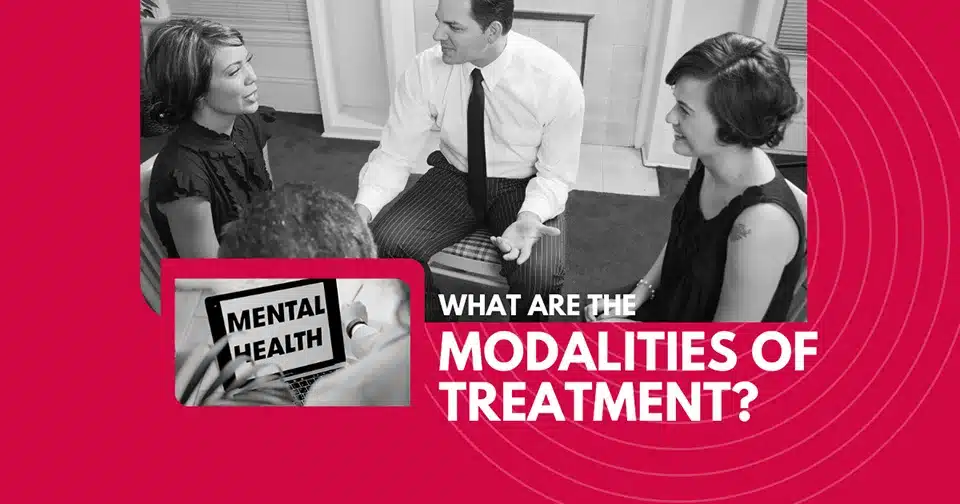In addiction treatment and recovery, we often hear the term modalities of treatment. So what does this mean, and how does it apply in treatment programs?
What is the Definition of Treatment Modality?
The meaning and definition of treatment modalities aren’t reserved exclusively for substance abuse. In general, treatment modalities are methods of treatment. These modalities of treatment are ways that a doctor or another health care professional provides treatment for emotional, mental, or personality disorders.
Treatment modalities can also be about treating a dual diagnosis. A dual diagnosis is when someone has a substance use disorder and another co-occurring mental health disorder requiring appropriate treatment.
Treatment modality can be used interchangeably with treatment type or treatment approach.
Every person is unique, as is their history with substance use and mental health, so everyone needs an individualized approach to their treatment.
Therapeutic and Clinical Treatment Modalities
When we talk about treatment modalities, we often do so specifically regarding counseling and therapy.
Regardless of the type of therapy, the goal is to help someone deal with their symptoms. Modalities of treatment that are most frequently used for addiction and other mental health disorders include:
- Cognitive-behavioral therapy (CBT): This treatment helps people learn to change their thought patterns. A therapist and their client can work to identify the client’s negative thought patterns, replacing them with healthier or more productive alternatives. CBT is a therapy modality most often used for anxiety, depression, substance use, obsessive-compulsive disorder (OCD), and self-esteem issues.
- Eye movement desensitization and reprocessing (EMDR): In this treatment modality, the patient will recall traumatic events during their sessions with the therapist’s guidance. Then, they move their eyes in a certain pattern while doing so. The objective is to help the patient reduce the stress they associate with the traumatic event. EMDR is well-suited to post-traumatic stress disorder (PTSD).
- Psychodynamic therapy: This is a form of therapy that stems from psychoanalysis. While CBT and many other types of talk therapy tend to be fairly short-term and have a definitive end date, psychoanalysis is long-term. You can talk about whatever’s on your mind to uncover thoughts or behavioral patterns contributing to your distress. The objective of psychodynamic therapy is to have you work through the connection between your unconscious mind and your actions.
- Behavioral therapy: CBT is just one type of the larger modality of behavioral therapy. No matter the type, behavioral therapy works to help you change your reactions and behavioral patterns, which cause you to feel distressed. One subtype of behavioral therapy is called systematic desensitization. This combines relaxation exercises with slow, gradual exposure to something you fear. Behavioral therapy can help with substance use disorders, anxiety, phobias, and OCD, among other mental health conditions.
- Dialectical behavioral therapy (DBT): This is a subtype of CBT, using a similar approach but with more of a focus on emotional regulation and acceptance. In DBT, you work to develop skills to help you cope with distressing or challenging things. You learn acceptance of difficult emotions when they inevitably occur.
- Family therapy: When you’re receiving treatment for a substance use disorder, one of the treatment modalities is often family therapy. Addiction affects families in significant ways. During family therapy, especially as a treatment modality for substance abuse, you work to resolve particular issues in the family unit. A therapist can help the family understand and begin to work through negative behavior patterns that lead to underlying issues. Along with family therapy for people with substance use disorders, it can help with eating disorders, OCD, anxiety, and behavioral problems. Like family therapy, couples therapy might be part of a holistic approach to addiction treatment for married people struggling with addiction.
- Group therapy: In rehab centers, there is often a combination of individual and group therapy. In group therapy, you come together with people who have experiences similar to your own. A therapist will lead discussions, and then you’re free to contribute your personal experiences and thoughts. This treatment modality for substance abuse helps you see you aren’t alone, and you can build a social support network.
- Mindfulness therapy: With this modality, you work on practicing to become present in the moment. You learn how to observe what’s happening at the moment and accept it without judgment.
Other Treatment Options and Therapeutic Approaches
Alternative and holistic therapies are helpful for people with mental health issues or problems with drugs or alcohol.
For example, art therapy is one such alternative therapy. Art therapy teaches you how to explore your feelings and thoughts as you make something. You create artwork based on guidance from a therapist. You can then share with the group about your art.
Motivational interviewing is another of the wide range of therapy approaches used to treat mental disorders and as part of substance abuse treatment programs.
Social skills training provides the opportunity to build better means of communicating with other people. When you learn how to interpret and respond to social signals, you can change how you behave in situations and form stronger relationships with friends and family.
Relapse prevention is a type of cognitive-behavioral therapy that helps you identify and prevent situations that could be high-risk for you. You learn more about what leads to relapse and then very particular skills you can use to prevent this.

Types of Rehab
When we talk about modalities of treatment for addiction, we can also discuss the different settings where you can receive care.
One option, for example, is inpatient rehab. Inpatient rehab isn’t necessarily a treatment modality but an environment conducive to certain modalities like group and family therapy. At an inpatient program, you live onsite.
The environment is structured, safe, and stable. You can remove yourself from your substance abuse environment as you focus exclusively on your recovery.
An outpatient program doesn’t require you to live onsite. You might go to outpatient rehab after completing an inpatient program or start with outpatient rehab. Cognitive-behavioral therapy, dialectical behavioral therapy, and EMDR are all treatment modalities you might participate in during outpatient programs.
Individualized Treatment Plans in Orange County, CA
Multiple treatment modalities are often combined when someone gets help for an alcohol or drug use disorder. There’s no one specific treatment that works universally for every person. We’re complex, complicated individuals, and treatment needs to reflect that.
If you get help for an addiction, you might participate in group and individual therapy, art therapy, and family therapy, all as part of a larger treatment plan. Your treatment plan might also include medication.
Then, as needed, your treatment plan can be adjusted and updated to fit your evolving needs.
If you’d like to learn more about modalities of treatment for drug and alcohol issues or mental health services, contact the Opus Health Costa Mesa team today by calling 855-953-1345.




